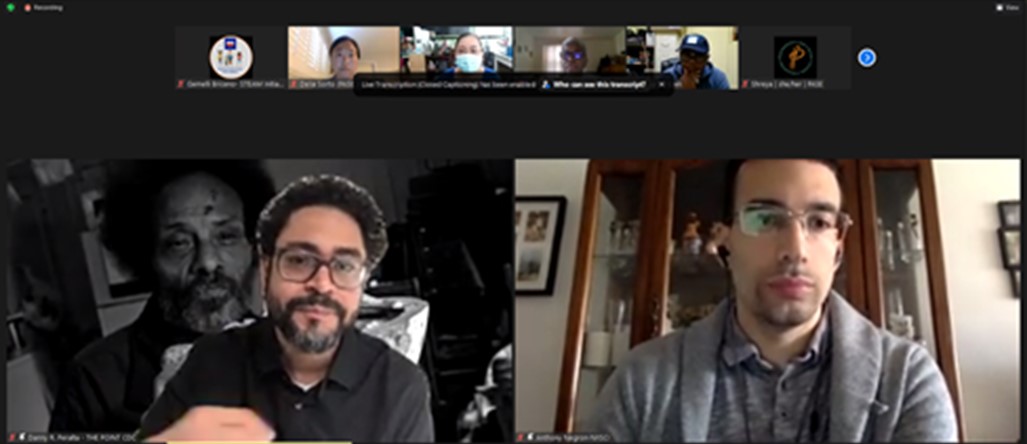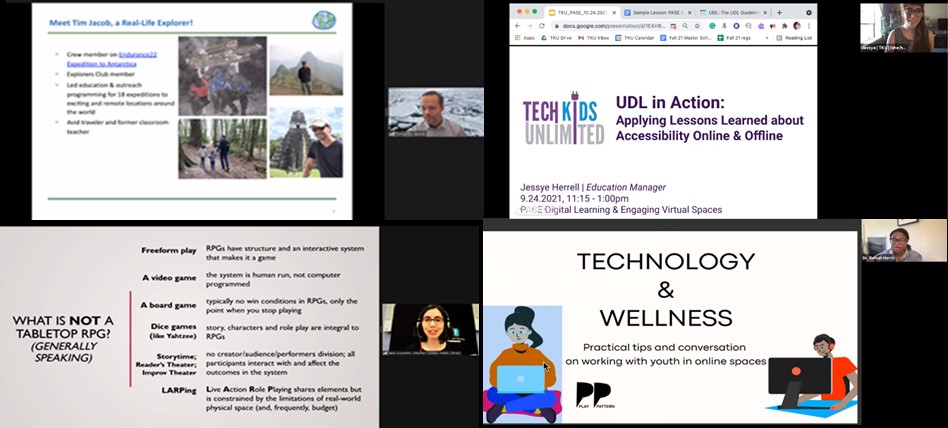
 Department of Design and Construction311
Department of Design and Construction311 Search all NYC.gov websites
Search all NYC.gov websites
DDC STEAM Participates in Digital Learning and Engaging Virtual Spaces Forum
On Friday, September 24th, 2021, DDC STEAM participated in the Partnership for After School Education’s Digital Learning & Engaging Virtual Spaces Forum. Partnership for After School Education (PASE) advances and supports quality afterschool programs in underserved communities. Educators from around New York City attended a variety of virtual workshops with presentations from afterschool programs providing best practices for digital learning to addressing the many challenges related to digital inequity. PASE recognizes the important role afterschool programs play in helping to enrich students’ emotional, social, and intellectual development. During the workshop, participants discussed how to best leverage technology to advance youth work goals, deepen engagement, and build and maintain relationships.

Panelists from the New York Hall of Science and The Point shared how their respective organizations used technological improvements and communications to support staff and students virtually during the pandemic. Anthony Negron, Manager of Digital Programming at The New York Hall of Science, oversees a portfolio of projects and programs that integrate technology into education. The NY Hall of Science aimed to bring the hands-on concept of their museum to their virtual programming during quarantine. Anthony shared his experience working with teachers and students in Corona, Queens to develop computational thinking with an efficient virtual program. “Eighteen months ago, there was a shift to heavy reliance on digital learning as a primary data modality for engaging our young people. The most basic definition of digital learning is learning that enhances facilitation using digital tools or technology,” stated Mr. Negron.
Danny Peralta, Director of Arts and Education at The Point, has partnered with several organizations to address the need for young people to experience working with digital technology. “The Point is always trying to bring technology into young people’s hands as another creative tool for problem solving and assisting young people in educating themselves,” stated Mr. Peralta. The goal is to bridge the gap by getting students to engage digitally by addressing real-world issues and have them still be in the physical presence of those issues in their community. “For the most part, we wanted to get young people to learn about each other and each other’s communities by doing things together in a hybrid way to connect the generations and learning,” added Mr. Peralta.
Workshops were hosted by facilitators from esteemed non-profits and organizations that promote education in and out-of-school settings. Dr. Ronah Harris, founder of Play Pattern LLC, discussed the shift in technology as an “entertainment space to a real key set of tools that have to be had in order to be efficient in the workplace;” how educators can psychologically support students in wellness, and provide basic digital literacy media skills to process what they are going through. Attendees discussed technology and wellness as educators aimed to create digital citizenship within students by developing character education focused on respecting themselves and others.
Other topics of discussion included transitioning back to in-person while still using technological elements, and resources such as films to illustrate the danger of selling their data by using certain social media platforms.

Colin Teague, Associate Director, and Keyli Peralta, Program Associate from Reach the World, hosted a workshop on integrating virtual field trips into the classroom to inspire student to become curious, confident, and compassionate global citizens. Reach the World brings real-life explorations through the virtual exchange expedition Endurance22, which allows students to experience the explorer mindset through written articles, lesson plans and activities, and live video calls with experts in marine archaeology, Antarctic wildlife, and much more.
Librarians Ilana Soorenko and Alex Armstrong introduced the world of virtual gaming and role-playing games (RPG’s) through the Teen Virtual Gaming Committee, which was offered virtually at the Queens Public Library during the pandemic. Teen librarians had been providing role-playing games and other gaming programs remotely since April 2020. Ilana and Alex explained the development of digital citizenship through virtual gaming by teaching youth how to manage interpersonal conflicts, regulate emotions, develop creative problem-solving skills, teamwork, inclusion, empathy and navigating rule systems.
Jessye Herrell works as an Educator Manager at Tech Kids Unlimited (TKU), an educational nonprofit that teaches technology and computational thinking. The learners at Tech Kids Unlimited include students on the autism spectrum, students with ADHD, sensory processing disorder, language disorders, learning disabilities, anxiety disorders, etc. Jessye discussed the Universal Design for Learning (UDL) as it applies to accessibility online and offline, stating “In the context of learning, a simple definition is that every learner has the opportunity to access the same material and participate fully without barriers.” Common examples of accessibility in action include closed captions, alt-text, rampa, automatic doors, dark mode, and sensory guides. “Designing for accessibility is proactive, not reactive. When something is accessible, fewer people need changes made to use the thing in question,” stated Jessye Herrell.
PASE’s Digital Learning & Engaging Virtual Spaces Forum provided information and resources to youth development organizations, formal, and informal educators to help them make decisions as it relates to digital learning, and the importance of partnership and collaborative efforts. Panelists and facilitators provided digital engagement tools that educators can use to balance a creative and healthy relationship with technology for students.
About the NYC Department of Design and Construction
The Department of Design and Construction is the City’s primary capital construction project manager. In supporting Mayor de Blasio’s long-term vision of growth, sustainability, resiliency, equity and healthy living, DDC provides communities with new or renovated public buildings such as such as firehouses, libraries, police precincts, and new or upgraded roads, sewers and water mains in all five boroughs. To manage this $15.5 billion portfolio, DDC partners with other City agencies, architects and consultants, whose experience bring efficient, innovative and environmentally-conscious design and construction strategies to City projects. For more information, please visit nyc.gov/ddc


